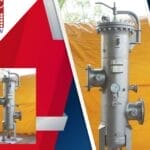Ensuring Cleaner Emissions
In the quest for cleaner air, industries are now relying heavily on natural gas scrubbers. Fuel gas scrubbers are systems that play a key role in removing pollutants from natural gas before it is released into the atmosphere. They are the gas industry’s environmental watchdogs. Rightly so, because they work tirelessly to ensure that harmful substances like sulfur compounds and particulate matter don’t make their way into the air that we breathe.
It is well known that the air quality is more important than ever. With rising industrial demands, maintaining clean emissions is a major concern. Natural gas scrubbers go a long way in ensuring the filtering out of contaminants. This not only helps protect the environment but also supports regulatory compliance.
By effectively removing these pollutants, scrubbers play a critical role in reducing the impact of natural gas operations on our planet. These scrubbers help lower the risk of acid rain, smog, and other environmental issues, which makes the air safer and cleaner for every life on the planet.
The Role of Demister Pads in Gas Scrubbing
Demister pads enhance the efficiency of gas scrubbing systems as their main role is to address a key challenge: the removal of liquid droplets from the gas stream. Made from a mesh of fine wire or synthetic fibers, the demister pads are strategically positioned within the scrubber. This helps them to intercept and capture mist and entrained liquid droplets that are a part of the gas.
When the gas passes through the demister pad, the liquid droplets coalesce on the fibers. As time goes by, this forms larger droplets that eventually become heavy enough to fall out of the gas stream. This process has two major benefits: it prevents these droplets from escaping into the environment and it also protects downstream equipment from potential damage and fouling that is usually caused due to liquid accumulation.
The role of the demister pads is that they ensure that only clean, dry gas exits the scrubber. Their role is vital in achieving optimal performance, reducing maintenance requirements, and ensuring compliance with environmental regulations. Essentially, the demister pads are a fundamental component in achieving cleaner emissions and safeguarding both the environment and the integrity of the gas processing system.
Understanding the Knockout Drum: Separating Liquids from Gases
Part of the flare header system, the main component in petroleum and natural gas refineries, the knockout drum helps in removing oil and liquids from flare gases. Usually in these plants, the gases that are released contain certain amounts of oil and water that can be hazardous to the environment. The flare system works to safely remove these gaseous wastes from the processing setup by burning the gas first without releasing it into the atmosphere.
By this system, the hydrocarbon gases that are generally produced in an industrial plant setup are not directly released but converted to carbon dioxide and water vapor, thus making this component a champion for the environment.
Why is the removal of liquids and oil from flare gases important?
Removal of liquids and oil from flare gases is necessary mainly because:
- 1. Contaminants in oil lead to unstable burning and this is hazardous
- 2. The water droplets can extinguish flare flames
- 3. Liquids can cause excess smoking
- 4. When burning liquid and oil contaminants they release chemical sprays that can be dangerous
Environmental Benefits of Effective Gas Scrubbing
Effective gas scrubbing offers significant environmental benefits as it plays a very important part in reducing the emission of harmful pollutants into the atmosphere. These systems are designed to remove contaminants such as sulfur compounds, particulate matter, and other noxious gases from industrial processes before they are released. As we can understand, effective gas scrubbing has several important positive impacts on the environment.
By capturing and filtering out pollutants, gas scrubbers help prevent air quality degradation. This is crucial when it comes to reducing the formation of smog and acid rain, both of which can have detrimental effects on ecosystems, water sources, and public health. When there is improvement in air quality it means fewer respiratory issues for humans and less harm to plant and animal life.
Effective gas scrubbing contributes to mitigating climate change. By removing greenhouse gases and other pollutants from emissions, scrubbers help to reduce the overall carbon footprint of industrial operations. This is an important step towards meeting global climate targets and promoting sustainability.
Gas scrubbers also play a role in protecting natural resources. For example, reducing sulfur dioxide emissions helps prevent soil acidification, which can damage crops and forests, while controlling particulate emissions helps keep water sources cleaner by preventing contamination from airborne particles.
Along with all these direct environmental benefits, effective gas scrubbing can also help industries comply with increasingly stringent environmental regulations. This not only avoids potential legal and financial repercussions but also promotes a positive corporate image and supports the transition to more sustainable practices.
Effective gas scrubbing is a powerful tool in the fight against pollution and environmental degradation. By ensuring cleaner emissions, it helps protect air quality, combat climate change, preserve natural resources, and support regulatory compliance, contributing to a healthier planet for current and future generations. If you want to implement sustainable filtration products into your industrial process, contact Sungov Engineering today to understand how you can bring the process seamlessly into your system.




